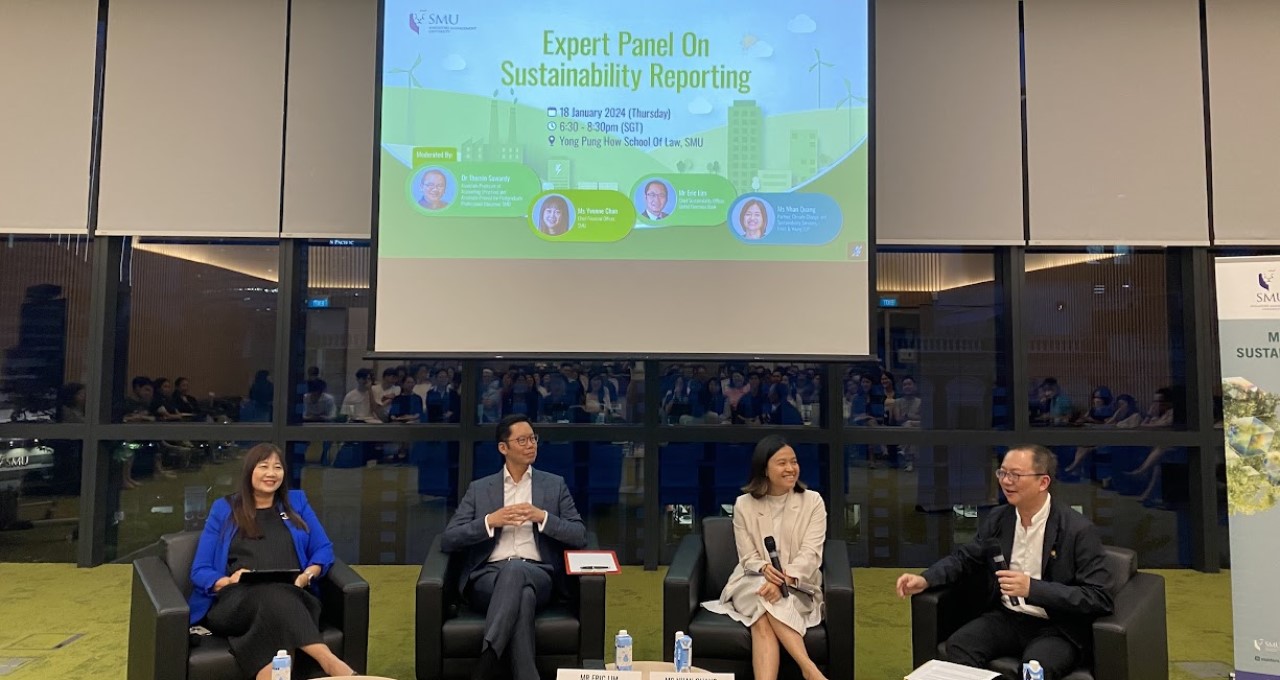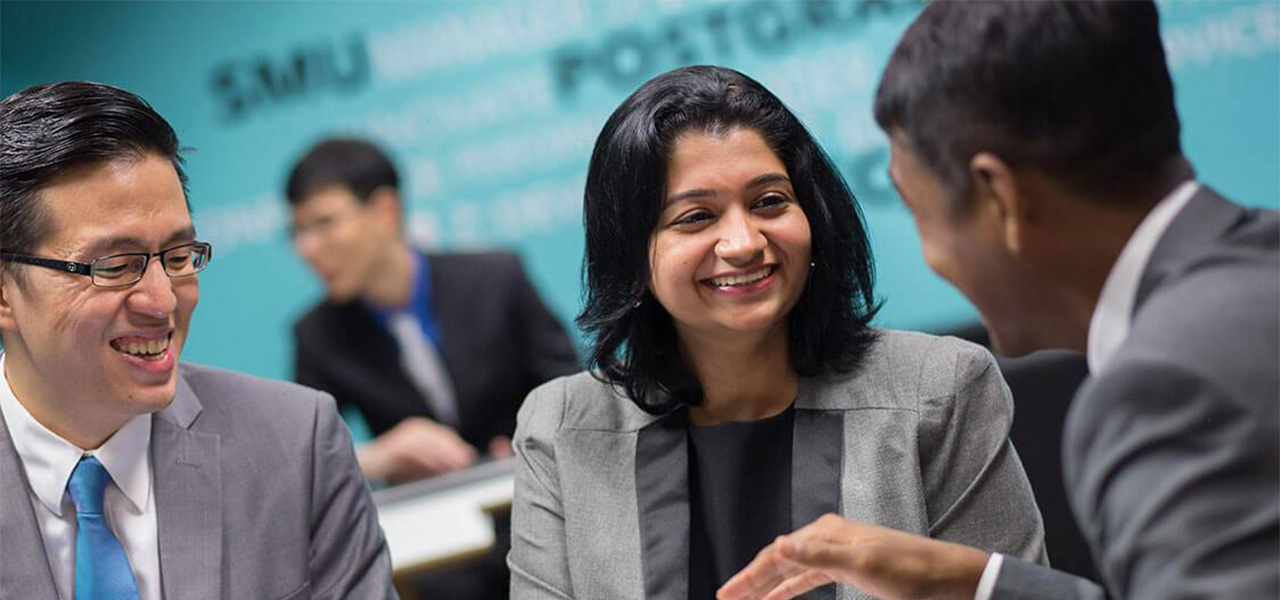“Sustainability” has transcended beyond a mere buzzword to become a cornerstone in shaping the future of business and public policy. This transition brings into sharp focus the role of sustainability reporting—a critical tool for transparency, accountability, and fostering a culture of continuous improvement in environmental stewardship.
Set against this dynamic backdrop, the ‘Expert Panel on Sustainability Reporting’ held at the Yong Pung How School of Law at the Singapore Management University (SMU) on 18 January 2024, shed light on the nuances of this crucial topic. Organised in the run-up to the commencement of SMU’s new Master of Sustainability (MST) programme, the event illuminated the complexities of sustainability reporting in our modern world.
The panel convened a diverse group of thought leaders: Mr Eric Lim, Chief Sustainability Officer at United Overseas Bank (UOB); Ms Nhan Quang, Partner, Climate Change and Sustainability Services at Ernst & Young LLP; and Ms Yvonne Chan, Chief Financial Officer at SMU. It was moderated by Dr Themin Suwardy, Associate Professor of Accounting (Practice) and Associate Provost for Postgraduate Professional Education at SMU.
Diverse perspectives on sustainability
The concept of sustainability, often perceived as a modern notion, is fundamentally rooted in the long-standing principle of enduring existence, as Ms Quang highlighted. “Sustainability shouldn’t be a new concept for anyone or any organisation,” she said, emphasising its relevance across all facets of life and business.
This traditional notion, however, faces a contemporary challenge: adapting to an evolving environment. The scope of sustainability has broadened, encompassing not only financial stability but also environmental impact and societal responsibility.
From a banking perspective, Mr Lim conveyed the concept of sustainability through the lens of an ‘economic industrial revolution’.
He explained, “We're talking about transforming business models, from generating 50 gigatonnes of greenhouse gases to achieving net-zero emissions.” This transition, according to Mr Lim, requires the adoption of new technologies and business strategies, crucial for sectors ranging from power generation to agriculture.
Ms Chan brought to attention the wide-ranging implications of sustainability in the public sector, referencing initiatives like the Singapore Green Plan 2030. She highlighted that the shift in focus on sustainability from the private sector to the public sector underscores its impact on accounting practices.
In addition, the growing emphasis on sustainability would extend beyond direct implications like carbon taxes to influence broader aspects of the supply chain.
“Sustainability is not new in the world of accounting,” she noted, linking it to the traditional going-concern concept in accounting, which assumes that a business would continue its operation indefinitely.
“[However, with this shift in focus on sustainability,] it will continue to raise questions like ‘Is your entire supply chain green?’”
Ms Chan further elaborated that businesses failing to engage in sustainability reporting might eventually face exclusion from the supply chain.
How going green has shaped the value chain dynamics
The panellists also discussed how sustainability has impacted the transformation of value chains, as well as the spectre of greenwashing.
Mr Lim emphasised the pressing need and intricate nature of adapting value chains, particularly within sectors like real estate. He illustrated an example where large property developers imposed non-standardised sustainability criteria, such as energy efficiency, on their contractors, catching many unprepared.
Therefore, he emphasised the critical need for businesses, regardless of size, to anticipate and adapt to these evolving demands. This implies that sustainability reporting should be regarded as a proactive strategy rather than a reactive measure.
Building upon this idea, Ms Chan underscored the substantial impact of government actions on the sustainability landscape.
With the Singapore government mandating sustainability reporting for statutory boards, she foresaw a cascading effect that would reshape the entire business ecosystem, highlighting the far-reaching consequences of these policy shifts.
Addressing greenwashing, Ms Quang argued that robust reporting standards and public scrutiny are effective antidotes to superficial sustainability claims.
Mr Lim echoes this viewpoint, indicating most greenwashing cases arise from overenthusiasm rather than intentional malice. He further elaborated on the intense scrutiny organisations face as a mechanism that separates genuine sustainability efforts and mere posturing.
“If you don’t have content and strategies aligned with governance standards that can be effectively implemented, your sustainability efforts won’t endure,” he says, encapsulating the importance of authenticity and depth in sustainability initiatives.
Deciphering the ABCs of sustainability reporting
The panellists echoed a common theme in sustainability reporting: the challenge of navigating a complex ‘alphabet soup’ of emerging standards.
Ms Chan underscored the confusion and complexity they present yet advocated for a pragmatic approach, highlighting the importance of starting with manageable goals and progressively adapting over time.
“For instance, we now have a shift from traditional methods of sustainability reporting to newer frameworks, such as the Task Force on Climate-related Financial Disclosures (TCFD) as well as the International Financial Reporting Standards’ S1 and S2,” adds Ms Quang.
She also noted a transition from an ‘inside-out’ perspective, which focuses on an organisation’s impact on the world, to an ‘outside-in’ perspective, which considers how external changes affect operational risks. “It’s no longer just about goodwill—it’s about managing your operational risks,” she said.
“Standards like S1 and S2 also play a crucial structural role, which levels the playing field across the entire economy by normalising non-financial data for decision-making and risk assessment,” Mr Lim added.
However, Ms Chan cautioned about the impending reality of mandatory standards and the associated challenges in data gathering and assurance, expressing concerns about the lack of precedents and industry-specific guidelines.
“This can lead to a lot of initial confusion, but consistent and transparent data collection should help ensure reliable reporting,” she explained.
Preparing for the ever-evolving sustainability landscape
Marked by rapid development and a broad spectrum of specialisations, sustainability is truly a dynamic field, where adaptability and a spirit of continuous learning are must-haves.
“Three months in sustainability is like three years in the rest of the world,” said Mr Lim, referring to the rapid change in the data available. He shared UOB’s strategy of building a sustainability-focused core team, comprising not just experts but passionate individuals who work collaboratively across various bank departments.
Ms Chan also pointed out the interdisciplinary nature of sustainability. “It cuts across various fields like accounting, law, engineering, and marketing. So, programmes like the SMU MST programme can provide a foundational understanding of sustainability, adaptable to different industries and roles,” she said.
Encapsulating the panel’s sentiment, Ms Quang encouraged everyone to embark on sustainability regardless of one’s current field. “Just start,” she advised, emphasising the growing demand for professionals versed in sustainability.
She highlighted the evident emerging opportunities for accountants in sustainability reporting, given the integration of financial and non-financial information.
Overall, the panel discussion exemplified the relevance of a broad base education in sustainability. SMU offers MST students a unique educational experience in sustainability where one can be equipped with knowledge, toolkits, and skills while picking up valuable current industry insights and experience through networking, real-world projects and internships.
Jointly led by the School of Social Sciences and the College of Integrative Studies, the MST programme offers an interdisciplinary curriculum that integrates various domains across SMU. This prepares students for the evolving demands of the green economy, with a focus on sustainability reasoning, communication, coordination and management, while also familiarising them with the United Nations’ Sustainable Development Goals and the Singapore Green Plan 2030.
Ready to embark on a transformative journey towards becoming a sustainability leader? Explore the possibilities with SMU's Master of Sustainability programme. Use promo code SMDFEB24 to enjoy a waiver of application fee when you apply before 29 Mar 2024.





